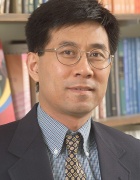Faculty Spotlight - Zhiqiang Liu
Professor Zhiqiang Liu is an applied microeconomist with a focus in economic growth and development, human capital, and the Chinese Economy. He received his PhD from the University at Buffalo. In addition to his position in the Department of Economics, Professor Liu is the Director of the UB Confucius Institute. You can find him teaching Economic Development (ECO 416, 516, and 725), Microeconomic Theory (ECO 405 and 505), and Information and Internet Economics (ECO 455 and 555)!

Dr Zhiqiang Liu
Why did you choose economics? Why did you choose your subfield?
ZL: My undergraduate major, management, did not excite me. I fell in love with economics after taking a couple of economics courses at UB as an MBA student. I did well enough for Professor Isaac Ehrlich to accept me as his Ph.D. student. I attended a number of high-quality conferences in Buffalo on economic growth and development organized by Professor Ehrlich that featured presentations and discussions by noble laureates Gary Becker, James Buchanan, Ronald Coase, Robert Lucas, Paul Romer, and other luminaries such as Robert Barro, Stanley Fischer, Arnold Harberger, Sherwin Rosen, Larry Summers, and Finis Welch. These conferences played a major role in my choosing growth and development (with an emphasis on the role of human capital) as one of my subfields.
What research are you working on right now?
ZL: I am working on a number of projects. The one that is unique is a study about the “dual-teacher program” in China that makes the recorded lectures from a magnet middle school in Beijing available through the internet to middle schools in remote and poor areas. Thus, students in the latter learn from two teachers. Collaborating with colleagues, we evaluate the effectiveness of the program in improving student performance in resource-lacking schools. Preliminary results we have obtained so far are very encouraging.
What was your favorite paper to write, and why?
ZL: I have a few. The most recent one was “Children’s Education and Parental Health,” published in the latest issue of the American Journal of Health Economics (Winter 2021). It was a favorite paper to write partly because it is my first research in the area of health economics! The study fills a void in the literature on the education-health gradient, which has focused on the effect of one’s own education on adult health and the effect of parental education on children’s health. I find that adult children’s education has a positive and causal impact on parental health outcomes through several channels, including smoking behavior, use of preventive care, and especially management of chronic conditions. This finding suggests that investing in education of the young generation can help reduce health disparities in the older generation.

Fast Facts
What is your favorite class to teach, and why?
ZL: I enjoy teaching all my classes. If I have to name a favorite one, it would be microeconomic theory because I think it is the most impactful course for students to decide whether they choose to major in economics or learn more about economics.
What was your favorite class as an undergrad?
ZL: My favorite class as an undergrad was calculus. I am sure it would have been microeconomics, if it was available back in my undergraduate years in China.
What is your top piece of advice for your students?
ZL: Try to see the world through the lens of economics. It is fun and could potentially be profitable.